Search Thermo Fisher Scientific
Invitrogen
alpha Tubulin Polyclonal Antibody
FIGURE: 1 / 9
alpha Tubulin Antibody (PA5-19489) in ICC/IF
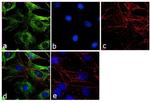
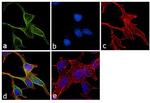
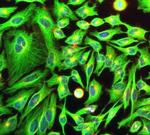
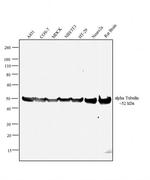

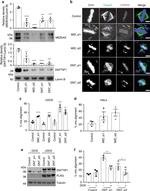
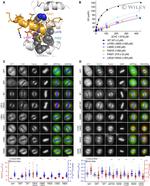
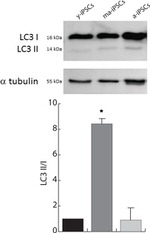
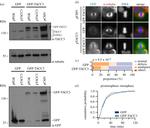
Product Details
PA5-19489
Species Reactivity
Published species
Host/Isotype
Class
Type
Immunogen
Conjugate
Form
Concentration
Purification
Storage buffer
Contains
Storage conditions
Shipping conditions
RRID
Product Specific Information
PA5-19489 targets alpha Tubulin in immunofluorescence, immunohistochemistry (paraffin), and Western blot applications and shows reactivity with chicken, Indian muntjac, Chinese hamster, human, fruit fly, rat, African Green Monkey, and mouse samples. Perform heat mediated antigen retrieval via the pressure cooker method before beginning immunohistochemistry staining protocol.
The PA5-19489 immunogen is synthetic peptide conjugated to KLH derived from within residues 400 to the C-terminus of Human alpha Tubulin.
PA5-19489 detects alpha Tubulin which has a predicted molecular weight of approximately 50 kDa.
Target Information
Alpha Tubulin is a part of a heterodimer consisting of alpha and beta tubulin subunits. The alpha and beta tubulins, which are each about 55 kDa MW, are homologous but not identical. Alpha-beta tubulin heterodimer is the basic building block of microtubules, and this intracellular cylindrical filamentous structure is present in almost eukaryotic cells. Microtubules serve as structural supports and lines of transport within the cell, as well as serving a key role in mitosis. Microtubules of the eukaryotic cytoskeleton perform essential and diverse functions and are composed of a heterodimer of alpha and beta tubulins. The alpha and beta tubulins represent the major components of microtubules, while gamma tubulin plays a critical role in the nucleation of microtubule assembly. There are multiple alpha and beta tubulin genes, which are highly conserved among species. The gene that encodes alpha tubulin is highly similar to the mouse and rat Tuba1 gene. Northern blotting studies have shown that the gene expression is predominantly found in morphologically differentiated neurologic cells.
For Research Use Only. Not for use in diagnostic procedures. Not for resale without express authorization.
Bioinformatics
Protein Aliases: alpha tubulin; alpha-tubulin; Alpha-tubulin 1; Alpha-tubulin 2; Alpha-tubulin 3; Alpha-tubulin 3C; alpha-tubulin 3C/D; Alpha-tubulin 3E; Alpha-tubulin 4; Alpha-tubulin 6; Alpha-tubulin isotype M-alpha-1; Alpha-tubulin isotype M-alpha-2; Alpha-tubulin isotype M-alpha-4; Alpha-tubulin isotype M-alpha-6; Alpha-tubulin ubiquitous; beta-tubulin T beta15 (aa 1-445); class II beta-tubulin isotype; class IIb beta-tubulin; FLJ30169; H2 ALPHA; hum-a-tub1; hum-a-tub2; T beta-15; Talpha1 alpha-tubulin; Testis-specific alpha-tubulin; TUBA1/3/4; Tubulin alpha; Tubulin alpha chain-like 3; Tubulin alpha-1 chain; Tubulin alpha-1A chain; Tubulin alpha-1B chain; Tubulin alpha-1C chain; Tubulin alpha-2 chain; Tubulin alpha-3 chain; Tubulin alpha-3C chain; Tubulin alpha-3E chain; Tubulin alpha-4 chain; Tubulin alpha-4A chain; Tubulin alpha-6 chain; Tubulin alpha-ubiquitous chain; Tubulin B-alpha-1; Tubulin beta-2B chain; Tubulin H2-alpha; Tubulin K-alpha-1; tubulin, alpha 1; tubulin, alpha 1 (testis specific); tubulin, alpha 1a; tubulin, alpha 1b; tubulin, alpha 1c; tubulin, alpha 2; tubulin, alpha 3c; tubulin, alpha 3e; tubulin, alpha 4; tubulin, alpha 4a; tubulin, alpha 6; tubulin, alpha, brain-specific; tubulin, alpha, ubiquitous; tubulin, alpha-like 3; tubulin, beta 2; tubulin, beta 2B class IIb; tubulin, beta polypeptide paralog
Gene Aliases: 2410129E14Rik; ALS22; B-ALPHA-1; bA408E5.3; bA506K6.1; bcm948; brdp; H2-ALPHA; K-ALPHA-1; LIS3; M[a]4; M[a]6; PMGYSA; RGD1309427; RGD1565476; Tuba-1; TUBA1; TUBA1A; TUBA1B; TUBA1C; TUBA2; TUBA3; TUBA3C; TUBA3E; Tuba4; TUBA4A; TUBA6; TUBAL3; Tubb2; Tubb2a; TUBB2B
UniProt ID: (Human) Q71U36, (Human) P68363, (Human) Q9BQE3, (Human) P0DPH7, (Human) Q6PEY2, (Human) P68366, (Human) A6NHL2, (Human) Q9BVA1, (Mouse) Q5XJF8, (Rat) P68370, (Mouse) P05213, (Rat) Q6P9V9, (Mouse) P05216, (Rat) Q6AYZ1, (Mouse) P68368, (Rat) Q5XIF6, (Mouse) Q3UX10, (Mouse) Q9CWF2, (Rat) Q3KRE8
Entrez Gene ID: (Dog) 106557476, (Human) 7846, (Human) 10376, (Human) 84790, (Human) 7278, (Human) 112714, (Dog) 478918, (Human) 7277, (Human) 79861, (Dog) 487148, (Dog) 478702, (Human) 347733, (Mouse) 22142, (Rat) 64158, (Mouse) 22143, (Rat) 500929, (Mouse) 22146, (Rat) 300218, (Mouse) 22145, (Rat) 316531, (Rat) 291287, (Mouse) 238463, (Mouse) 73710, (Rat) 291081

Performance Guarantee
If an Invitrogen™ antibody doesn't perform as described on our website or datasheet,we'll replace the product at no cost to you, or provide you with a credit for a future purchase.*
Learn more
We're here to help
Get expert recommendations for common problems or connect directly with an on staff expert for technical assistance related to applications, equipment and general product use.
Contact tech support
